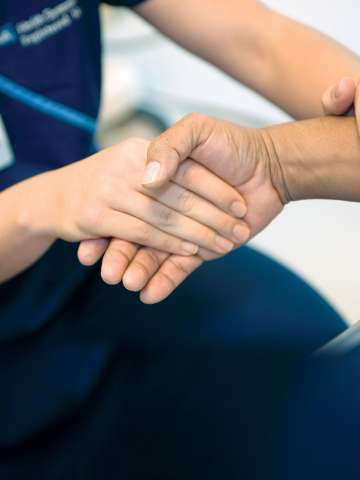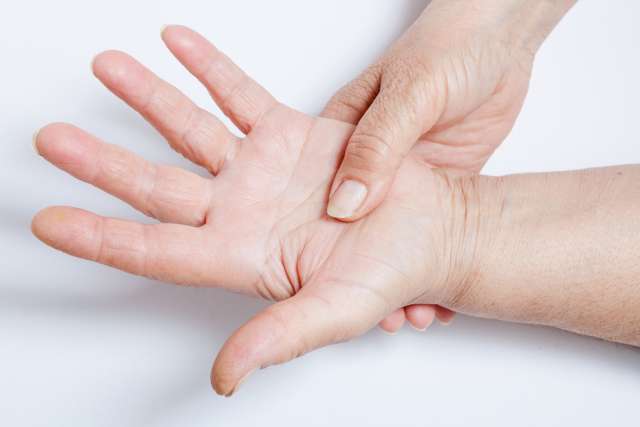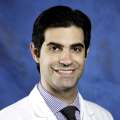Scleroderma Care
Our multispecialty team of scleroderma experts provides comprehensive, personalized care. We work together to create well-rounded treatment plans that help you achieve your best health.

Why choose UCLA Health for scleroderma care?
Specialists in the UCLA Health Scleroderma Program provide state-of-the-art diagnosis and treatment for scleroderma, a rare disease that causes inflammation and scarring in the skin or internal organs.
Our program is one of the largest referral centers in the world for scleroderma patients. It has also been a designated Scleroderma Center of Excellence with the Scleroderma Foundation for many years. This recognition underscores our commitment to comprehensive, high-quality scleroderma care.
Highlights of our program include:
Multispecialty team: A team of specialists works together to care for you. Your treatment may include care from a rheumatologist, pulmonologist, gastroenterologist, radiologist, cardiologist or hematologist, depending on your needs.
Personalized, holistic care: Our specialists aim to understand all the factors that affect your overall wellness. With this knowledge, we can make recommendations for lifestyle changes to improve your health. A nutritionist specializing in scleroderma makes diet recommendations to help you manage symptoms or medication side effects. In some cases, these changes can even reverse the effects of the disease. We offer meditation, yoga and other integrative services as needed.
Research emphasis: UCLA Health specialists are active researchers as well as clinical providers. We lead and participate in multiple scleroderma studies sponsored by the National Institutes of Health. Eligible patients can receive new, state-of-the-art treatment options.
Access to support resources: We hold support groups for patients living with scleroderma, so you can connect with others going through similar experiences. Whether you live in Southern California or elsewhere, our team helps you connect with supportive resources in your local community.
What is scleroderma?
Scleroderma is a rare autoimmune condition that causes inflammation or scarring (fibrosis) in your skin and internal organs. Autoimmune conditions occur when your immune system mistakenly attacks healthy tissues or body systems. The earliest signs of scleroderma usually include fatigue, hand swelling and Raynaud’s phenomenon, color changes in your hands that develop in response to cold temperatures or stress.
Scleroderma can affect multiple organ systems, including your:
Skin: Most people with scleroderma experience symptoms affecting their skin. The most common symptom is Raynaud’s phenomenon. Your skin may also thicken or tighten. Calcium deposits beneath the skin may appear as white spots that can press through the skin.
Lungs: Scleroderma can cause inflammation and scarring in lung tissue (pulmonary fibrosis or interstitial lung disease). As a result, your lungs stiffen and can’t take in enough oxygen. The condition may also cause blood vessel changes that increase blood pressure in your lungs (pulmonary hypertension).
Gastrointestinal tract: You may have problems with the esophagus that lead to heartburn, acid reflux or difficulty swallowing. Scleroderma may also affect the stomach, making you feel full after eating only a small amount. Small or large intestine problems may cause diarrhea, constipation, poor nutrient absorption, gas and bloating. You may experience problems with bowel movements, including fecal incontinence.
Kidneys: Scleroderma can cause problems with blood vessels in the kidneys, leading to restricted blood flow. When this happens, you may have increased blood pressure, leg swelling and poor kidney filtration, known as scleroderma renal crisis.
Heart: Scarring or fibrosis may also affect the heart muscle, causing heart rhythm problems (arrhythmias). You may feel like your heart is pounding (heart palpitations) or experience shortness of breath or chest pain.
Musculoskeletal system: Scleroderma can cause joint and muscle problems. Your skin and tendons may thicken, which can make it difficult to fully extend joints (joint contractures). Other symptoms include joint or muscle inflammation, swelling and stiffness.
Scleroderma tests and treatments we offer
Our multispecialty team offers the full range of scleroderma tests and treatment options. We comprehensively evaluate your symptoms and needs and find an effective treatment plan for you.
Scleroderma tests
Depending on what body systems scleroderma affects, your evaluation may include:
Skin tests: Your provider may physically examine you for signs of skin tightening or hardness. You may also have blood tests that assess your chances of developing further skin symptoms.
Lung tests: We may use imaging tests such as CT scans to look for lung scarring or inflammation. We may also use a pulmonary function test. You breathe into special tubes to help us evaluate how breath moves in and out of your lungs. A heart ultrasound (echocardiogram) may help us evaluate blood pressure in the lungs. You may also need a cardiac catheterization. For this procedure, your provider inserts a flexible, hollow tube (catheter) through a blood vessel and guides it to your heart to measure pressure in your pulmonary arteries.
Gastrointestinal (GI) tests: Your provider may evaluate the inside of your intestines with a lighted scope called an endoscope. Depending on your symptoms, we may use manometry to evaluate how your esophageal muscles contract to move food. Your esophagus is the tube that connects your throat to your stomach. We may also use gastric emptying studies or other additional tests to see how food moves through your digestive system.
Kidney tests: You may have blood tests to evaluate how well your kidneys filter waste from your body. If you have high blood pressure, your provider may also ask you to check your blood pressure at home every day.
Heart tests: If scleroderma affects your heart, you may have an echocardiogram to look at your heart’s structures and blood vessels. You may also have an electrocardiogram (ECG), which evaluates your heart rhythm. If your provider suspects you have inflammation around your heart, they may order a cardiac MRI, which uses magnets and radio waves to view your heart.
Musculoskeletal tests: Your provider performs a full physical exam to evaluate tenderness or swelling in your joints. They may order blood tests to look for inflammation or take an MRI of affected muscles or joints.
Scleroderma treatments
The goal of scleroderma treatment is to slow down and, in some cases, reverse progression of the disease. Depending on your symptoms, your treatment may include:
Lifestyle changes: Tailored nutrition guidance may help improve your health and quality of life. Diet changes may help lower inflammation, reduce gastrointestinal symptoms or manage medication side effects.
Medications: Many people with scleroderma take medications to reduce inflammation and scarring or suppress the immune system. We recommend the right medications for you and adjust them if your needs change.
Stem cell or organ transplants: In some cases, we may recommend a stem cell or organ transplant. Stem cell transplants replace bone marrow with healthy cells, which increases your body’s ability to create healthy red blood cells, white blood cells and platelets. An organ transplant replaces a damaged organ with a healthy one from a donor. Find out more about our transplant services.
Meet our team
Our scleroderma specialists are renowned experts in scleroderma diagnosis and treatment. We bring you leading-edge therapies and advanced treatments backed by research. We also make recommendations for lifestyle changes to help you live a healthier life.
Rheumatology

Pulmonary

Gastroenterology
Cardiology

Radiology

Pathology
Contact us
Call 310-825-2448 to request an appointment with a scleroderma specialist at UCLA Health.
Find your care
Our scleroderma specialists are dedicated to high-quality, research-based care. Call 310-825-2448 to learn more about our scleroderma services.
Support Our Work
If you would like to learn more about ways to give, please contact our Senior Executive Director of Development, Laurel Zeno.
Call 310-418-2364 or email [email protected].
Thank you very much for your interest!

















